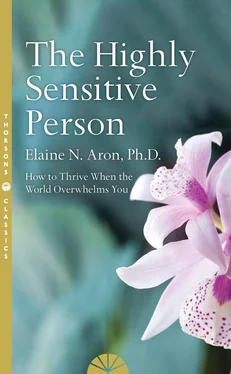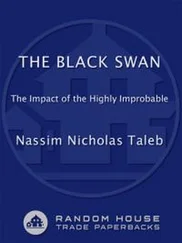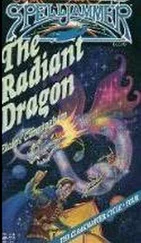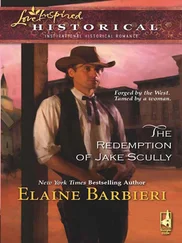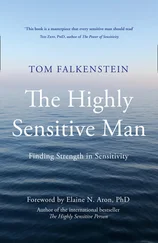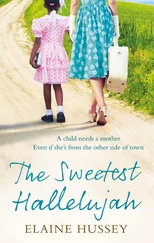Further, it is safe to say that everyone can become highly sensitive at times—for example, after a month alone in a mountain cabin. And everyone becomes more sensitive as they age. Indeed, most people, whether they admit it or not, probably have a highly sensitive facet that comes to the fore in certain situations.
And Some Things to Say to Non-HSPs
Sometimes non-HSPs feel excluded and hurt by the idea that we are different from them and maybe sound like we think we are somehow better. They say, “Do you mean I’m not sensitive?” One problem is that “sensitive” also means being understanding and aware. Both HSPs and non-HSPs can have these qualities, which are optimized when we are feeling good and alert to the subtle. When very calm, HSPs may even enjoy the advantage of picking up more delicate nuances. When overaroused, however, a frequent state for HSPs, we are anything but understanding or sensitive. Instead, we are overwhelmed, frazzled, and need to be alone. By contrast, your non-HSP friends are actually more understanding of others in highly chaotic situations.
I thought long and hard about what to call this trait. I knew I didn’t want to repeat the mistake of confusing it with introversion, shyness, inhibitedness, and a host of other misnomers laid on us by other psychologists. None of them captures the neutral, much less the positive, aspects of the trait. “Sensitivity” does express the neutral fact of greater receptivity to stimulation. So it seemed to be time to make up for the bias against HSPs by using a term that might be taken in our favor.
On the other hand, being “highly sensitive” is anything but positive to some. While sitting in my quiet house writing this, at a time when no one is talking about the trait, I’ll go on record: This book will generate more than its share of hurtful jokes and comments about HSPs. There is tremendous collective psychological energy around the idea of being sensitive—almost as much as around gender issues, with which sensitivity is often confused. (There are as many male as female babies born sensitive; but men are not supposed to possess the trait and women are. Both genders pay a high price for that confusion.) So just be prepared for that energy. Protect both your sensitivity and your newly budding understanding of it by not talking about it at all when that seems most prudent.
Mostly, enjoy knowing that there are also many like-minded people out there. We have not been in touch before. But we are now, and both we and our society will be the better for it. In chapters 1, 6, and 10, I will comment at some length on the HSP’s important social function.
I have found that HSPs benefit from a fourfold approach, which the chapters in this book will follow.
1. Self-knowledge. You have to understand what it means to be an HSP. Thoroughly. And how it fits with your other traits and how your society’s negative attitude has affected you. Then you need to know your sensitive body very well. No more ignoring your body because it seems too uncooperative or weak.
2. Reframing. You must actively reframe much of your past in the light of knowing you came into the world highly sensitive. So many of your “failures” were inevitable because neither you nor your parents and teachers, friends and colleagues, understood you. Reframing how you experienced your past can lead to solid self-esteem, and self-esteem is especially important for HSPs, for it decreases our overarousal in new (and therefore highly stimulating) situations.
Reframing is not automatic, however. That is why I include “activities” at the end of each chapter that often involve it.
3. Healing. If you have not yet done so, you must begin to heal the deeper wounds. You were very sensitive as a child; family and school problems, childhood illnesses, and the like all affected you more than others. Furthermore, you were different from other kids and almost surely suffered for that.
HSPs especially, sensing the intense feelings that must arise, may hold back from the inner work necessary to heal the wounds from the past. Caution and slowness are justified. But you will cheat yourself if you delay.
4. Help With Feeling Okay When Out in the World and Learning When to Be Less Out. You can be, should be, and need to be involved in the world. It truly needs you. But you have to be skilled at avoiding overdoing or underdoing it. This book, free of the confusing messages from a less sensitive culture, is about discovering that way.
I will also teach you about your trait’s effect on your close relationships. And I’ll discuss psychotherapy and HSPs—which HSPs should be in therapy and why, what kind, with whom, and especially how therapy differs for HSPs. Then I’ll consider HSPs and medical care, including plenty of information on medications like Prozac, often taken by HSPs. At the end of this book we will savor our rich inner life.
I am a research psychologist, university professor, psychotherapist, and published novelist. What matters most, however, is that I am an HSP like you. I am definitely not writing from on high, aiming down to help you, poor soul, overcome your “syndrome.” I know personally about our trait, its assets and its challenges.
As a child, at home, I hid from the chaos in my family. At school I avoided sports, games, and kids in general. What a mixture of relief and humiliation when my strategy succeeded and I was totally ignored.
In junior high school an extravert took me under her wing. In high school that relationship continued, plus I studied most of the time. In college my life became far more difficult. After many stops and starts, including a four-year marriage undertaken too young, I finally graduated Phi Beta Kappa from the University of California at Berkeley. But I spent my share of time crying in rest rooms, thinking I was going crazy. (My research has found that retreating like this, often to cry, is typical of HSPs.)
In my first try at graduate school I was provided with an office, to which I also retreated and cried, trying to regain some calm. Because of such reactions, I stopped my studies with a master’s degree, even though I was highly encouraged to continue for a doctorate. It took twenty-five years for me to gain the information about my trait that made it possible to understand my reactions and so complete that doctorate.
When I was twenty-three, I met my current husband and settled down into a very protected life of writing and rearing a son. I was simultaneously delighted and ashamed of not being “out there.” I was vaguely aware of my lost opportunities to learn, to enjoy more public recognition of my abilities, to be more connected with all kinds of people. But from bitter experience I thought I had no choice.
Some arousing events, however, cannot be avoided. I had to undergo a medical procedure from which I assumed I would recover in a few weeks. Instead, for months my body seemed to resound with physical and emotional reactions. I was being forced to face once again that mysterious “fatal flaw” of mine that made me so different. So I tried some psychotherapy. And got lucky. After listening to me for a few sessions, my therapist said, “But of course you were upset; you are a very highly sensitive person.”
What is this, I thought, some excuse? She said she had never thought much about it, but from her experience it seemed that there were real differences in people’s tolerance for stimulation and also their openness to the deeper significance of an experience, good and bad. To her, such sensitivity was hardly a sign of a mental flaw or disorder. At least she hoped not, for she was highly sensitive herself. I recall her grin. “As are most of the people who strike me as really worth knowing.”
Читать дальше
